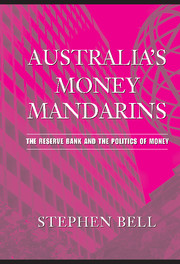Book contents
- Frontmatter
- Contents
- List of Illustrations
- Preface
- Abbreviations
- Introduction
- 1 Slowly Building the Reserve Bank
- 2 Into the Monetary Policy Wilderness
- 3 Snapping the Stick of Inflation
- 4 ‘A Measure of Peace’? Monetary Policy in the 1990s
- 5 Towards RBA Independence
- 6 RBA Independence – Why?
- 7 Should the RBA Be Independent?
- 8 Internal Governance and the Board
- 9 New Challenges in a World of Asset Inflation
- Conclusion
- Notes
- References
- Index
7 - Should the RBA Be Independent?
Published online by Cambridge University Press: 06 October 2009
- Frontmatter
- Contents
- List of Illustrations
- Preface
- Abbreviations
- Introduction
- 1 Slowly Building the Reserve Bank
- 2 Into the Monetary Policy Wilderness
- 3 Snapping the Stick of Inflation
- 4 ‘A Measure of Peace’? Monetary Policy in the 1990s
- 5 Towards RBA Independence
- 6 RBA Independence – Why?
- 7 Should the RBA Be Independent?
- 8 Internal Governance and the Board
- 9 New Challenges in a World of Asset Inflation
- Conclusion
- Notes
- References
- Index
Summary
The newly enshrined authority of the Reserve Bank has changed economic power in ways to which our political culture has not yet adapted.
Paul KellyWith greater independence and policy clout, central banks have been forced to shed their earlier mystique and confront the ‘democratic deficit’ which independence implies. The Australian Financial Review has said that an independent central bank ‘occupies an unusual place in a democracy’, largely because independence devolves substantial policy authority to unelected officials. In Europe there has been a debate about the ‘democratic deficit’ created by the highly independent European Central Bank. It is time for a similar debate in Australia.
As we have seen, central bank independence in Australia in the 1990s was worked out incrementally by a process of elite interaction and accommodation, and the idea was never fully debated in public. In fact, to most people it was not clear who was running monetary policy. By 1996, the incoming Howard government announced the independence of the Reserve Bank as a fait accompli. Yet, as the Australian Financial Review suggests: ‘While central bank independence has become an accepted part of the landscape in modern democracies, the idea deserves a lot more scrutiny because it really still is a work in progress.’
UNPACKING CBI
An independent central bank can be seen as an example of ‘new governance’, which emphasises government policy devolution and power-sharing with other institutions.
- Type
- Chapter
- Information
- Australia's Money MandarinsThe Reserve Bank and the Politics of Money, pp. 148 - 164Publisher: Cambridge University PressPrint publication year: 2004



